2018 PEUGEOT 5008 traction control
[x] Cancel search: traction controlPage 17 of 364

15
Warning/indicator lampStateCause Action/Observations
Orange warning/indicator lamps Braking Fixed. A minor fault with the braking
system. Drive carefully.
Have the system checked by a
PEUGEOT dealer or
a
qualified workshop as soon as possible.
Anti-lock
Braking System
(ABS) Fixed.
The anti-lock braking system has
a
fault.The vehicle retains conventional braking.
Drive carefully at reduced speed and contact
a
PEUGEOT dealer or a qualified workshop without
d e l ay.
Dynamic stability
control
(DSC/ASR) Flashing.
The DSC/ASR regulation is
operating. The system optimises traction and improves the
directional stability of the vehicle in the event of loss of
grip or trajectory.
Fixed. The DSC/ASR system has a
fault. Have the system checked by a PEUGEOT dealer or
a
qualified workshop.
Deactivation of
the automatic
functions of the
electric parking
brake Fixed.
The "automatic application" (on
switching off the engine) and
"automatic release" functions are
deactivated. Activate the functions again.
For more information on the Electric parking brake
,
refer to the corresponding section.
1
Instruments
Page 46 of 364

44
"Driving functions " tab
Function Comment
" Adjusting Speeds " Memorisation of speed settings for the speed limiter or
programmable cruise control.
"
Under-inflation initialisation "Reinitialisation of the under-inflation detection system.
" Lane departure warning system "Activation/deactivation of the function.
" Lane assist " Activation/deactivation of the function.
" Parking sensors " Activation/deactivation of the function.
" Park Assist " Activation/deactivation of the function.
" Automatic headlamp dip "Activation/deactivation of the function.
" Stop & Star t " Activation/deactivation of the function.
" Blind spot sensors " Activation/deactivation of the function.
" Panoramic visual aid "Activation of the Visiopark 2
function.
" Traction control" Activation/deactivation of the function. For more information on one of these
functions, refer to the corresponding
section.
Settings
PEUGEOT Connect Nav
The functions available through the
upper menu bar are detailed in the
table below.
Button Comments
Selection of a
topic.
Audio settings (sound ambience,
distribution, level, voice volume,
ringer volume).
Switch off the screen.
Settings for the touch screen and
the digital instrument panel.
Instruments
Page 97 of 364
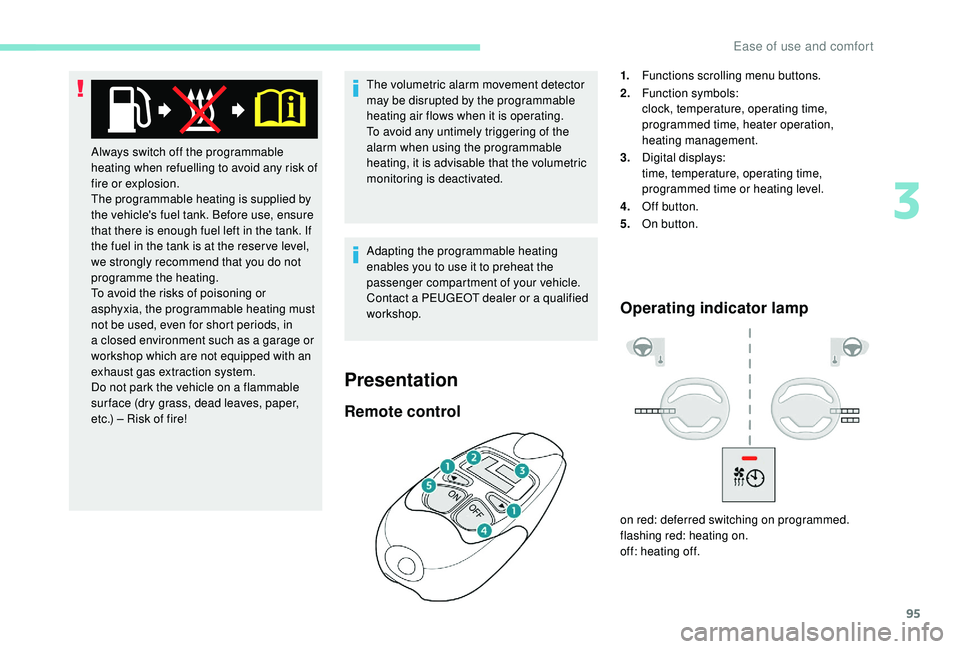
95
The volumetric alarm movement detector
may be disrupted by the programmable
heating air flows when it is operating.
To avoid any untimely triggering of the
alarm when using the programmable
heating, it is advisable that the volumetric
monitoring is deactivated.
Adapting the programmable heating
enables you to use it to preheat the
passenger compartment of your vehicle.
Contact a PEUGEOT dealer or a qualified
workshop.
Operating indicator lamp
Always switch off the programmable
heating when refuelling to avoid any risk of
fire or explosion.
The programmable heating is supplied by
the vehicle's fuel tank. Before use, ensure
that there is enough fuel left in the tank. If
the fuel in the tank is at the reser ve level,
we strongly recommend that you do not
programme the heating.
To avoid the risks of poisoning or
asphyxia, the programmable heating must
not be used, even for short periods, in
a
closed environment such as a garage or
workshop which are not equipped with an
exhaust gas extraction system.
Do not park the vehicle on a
flammable
sur face (dry grass, dead leaves, paper,
etc.) – Risk of fire!
Remote control
1. Functions scrolling menu buttons.
2. Function symbols:
clock, temperature, operating time,
programmed time, heater operation,
heating management.
3. Digital displays:
time, temperature, operating time,
programmed time or heating level.
4. Off button.
5. On button.
on red: deferred switching on programmed.
flashing red: heating on.
off: heating off.
Presentation
3
Ease of use and comfort
Page 127 of 364
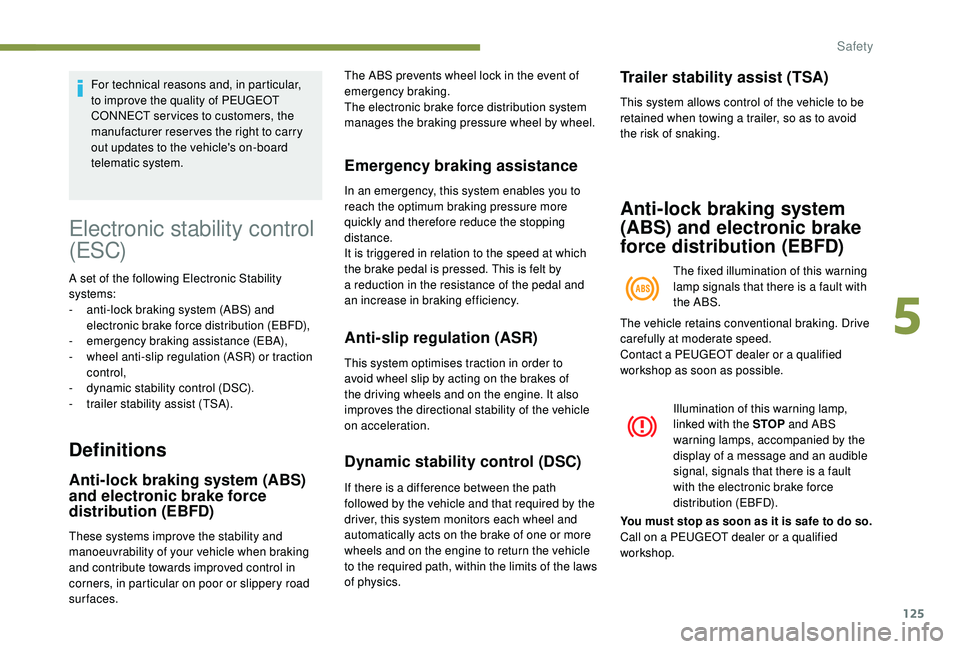
125
For technical reasons and, in particular,
to improve the quality of PEUGEOT
CONNECT ser vices to customers, the
manufacturer reser ves the right to carry
out updates to the vehicle's on-board
telematic system.
Electronic stability control
(ESC)
A set of the following Electronic Stability
systems:
-
a
nti-lock braking system (ABS) and
electronic brake force distribution (EBFD),
-
em
ergency braking assistance (EBA),
-
w
heel anti-slip regulation (ASR) or traction
control,
-
d
ynamic stability control (DSC).
-
t
railer stability assist (TSA).
Definitions
Anti-lock braking system (ABS)
and electronic brake force
distribution (EBFD)
The ABS prevents wheel lock in the event of
emergency braking.
The electronic brake force distribution system
manages the braking pressure wheel by wheel.
Emergency braking assistance
In an emergency, this system enables you to
reach the optimum braking pressure more
quickly and therefore reduce the stopping
distance.
It is triggered in relation to the speed at which
the brake pedal is pressed. This is felt by
a reduction in the resistance of the pedal and
an increase in braking efficiency.
Anti-slip regulation (ASR)
This system optimises traction in order to
avoid wheel slip by acting on the brakes of
the driving wheels and on the engine. It also
improves the directional stability of the vehicle
on acceleration.
Dynamic stability control (DSC)
If there is a difference between the path
f ollowed by the vehicle and that required by the
driver, this system monitors each wheel and
automatically acts on the brake of one or more
wheels and on the engine to return the vehicle
to the required path, within the limits of the laws
of physics.
Trailer stability assist (TSA)
These systems improve the stability and
manoeuvrability of your vehicle when braking
and contribute towards improved control in
corners, in particular on poor or slippery road
surfaces. This system allows control of the vehicle to be
retained when towing a
trailer, so as to avoid
the risk of snaking.
Anti-lock braking system
(ABS) and electronic brake
force distribution (EBFD)
The fixed illumination of this warning
lamp signals that there is a fault with
the ABS.
Illumination of this warning lamp,
linked with the STOP and ABS
warning lamps, accompanied by the
display of a
message and an audible
signal, signals that there is a
fault
with the electronic brake force
distribution (EBFD).
The vehicle retains conventional braking. Drive
carefully at moderate speed.
Contact a
PEUGEOT dealer or a qualified
workshop as soon as possible.
You must stop as soon as it is safe to do so.
Call on a
PEUGEOT dealer or a qualified
workshop.
5
Safety
Page 128 of 364
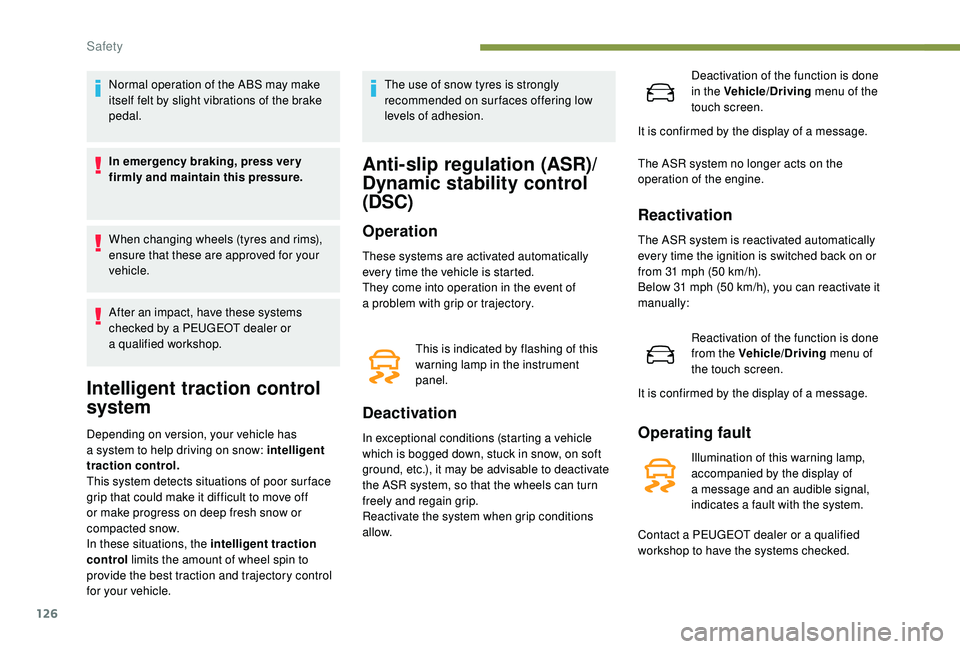
126
Normal operation of the ABS may make
itself felt by slight vibrations of the brake
pedal.
In emergency braking, press ver y
firmly and maintain this pressure.
When changing wheels (tyres and rims),
ensure that these are approved for your
vehicle.
After an impact, have these systems
checked by a PEUGEOT dealer or
a
qualified workshop.
Intelligent traction control
system
Depending on version, your vehicle has
a system to help driving on snow: intelligent
traction control.
This system detects situations of poor sur face
grip that could make it difficult to move off
or make progress on deep fresh snow or
compacted snow.
In these situations, the intelligent traction
control limits the amount of wheel spin to
provide the best traction and trajectory control
for your vehicle. The use of snow tyres is strongly
recommended on sur faces offering low
levels of adhesion.
Anti-slip regulation (ASR)/
Dynamic stability control
(DSC)
Operation
These systems are activated automatically
every time the vehicle is started.
They come into operation in the event of
a
problem with grip or trajectory.
Deactivation
In exceptional conditions (starting a vehicle
w hich is bogged down, stuck in snow, on soft
ground, etc.), it may be advisable to deactivate
the ASR system, so that the wheels can turn
freely and regain grip.
Reactivate the system when grip conditions
allow. Deactivation of the function is done
in the Vehicle/Driving
menu of the
touch screen.
The ASR system no longer acts on the
operation of the engine.
Reactivation
The ASR system is reactivated automatically
every time the ignition is switched back on or
from 31 mph (50 km/h).
Below 31
mph (50 km/h), you can reactivate it
manually:
Reactivation of the function is done
from the Vehicle/Driving menu of
the touch screen.
It is confirmed by the display of a
message.
Operating fault
This is indicated by flashing of this
warning lamp in the instrument
panel. It is confirmed by the display of a
message.
Illumination of this warning lamp,
accompanied by the display of
a message and an audible signal,
indicates a
fault with the system.
Contact a
PEUGEOT dealer or a qualified
workshop to have the systems checked.
Safety
Page 130 of 364
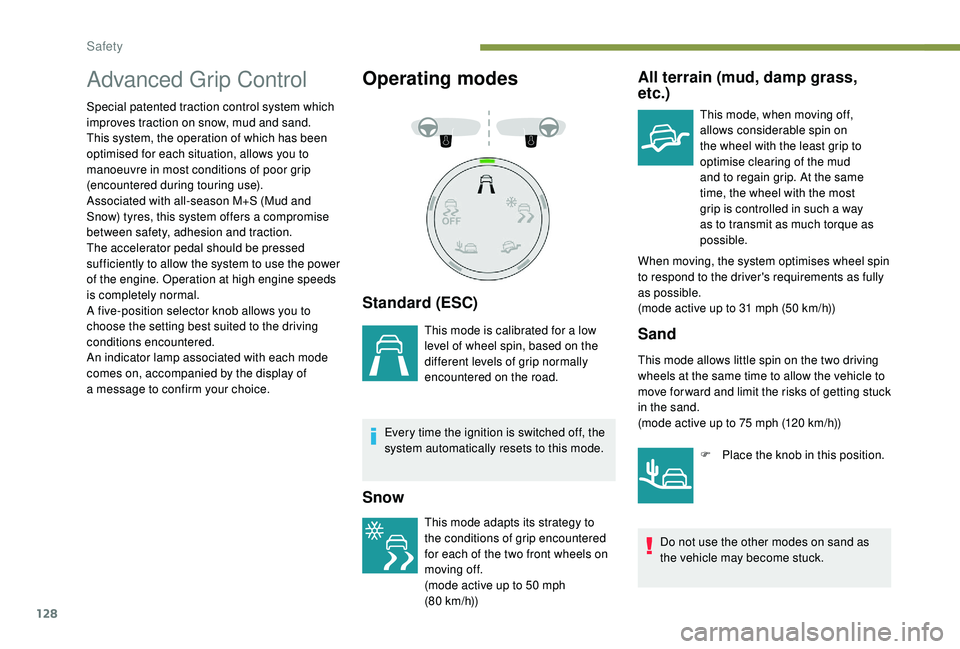
128
Advanced Grip Control
Special patented traction control system which
improves traction on snow, mud and sand.
This system, the operation of which has been
optimised for each situation, allows you to
manoeuvre in most conditions of poor grip
(encountered during touring use).
Associated with all-season M+S (Mud and
Snow) tyres, this system offers a compromise
between safety, adhesion and traction.
The accelerator pedal should be pressed
sufficiently to allow the system to use the power
of the engine. Operation at high engine speeds
is completely normal.
A five-position selector knob allows you to
choose the setting best suited to the driving
conditions encountered.
An indicator lamp associated with each mode
comes on, accompanied by the display of
a
message to confirm your choice.
Operating modes
Standard (ESC)
This mode is calibrated for a low
l evel of wheel spin, based on the
different levels of grip normally
encountered on the road.
Every time the ignition is switched off, the
system automatically resets to this mode.
Snow
This mode adapts its strategy to
the conditions of grip encountered
for each of the two front wheels on
moving off.
(mode active up to 50
mph
(80
km/h))
All terrain (mud, damp grass,
etc.)
This mode, when moving off,
allows considerable spin on
the wheel with the least grip to
optimise clearing of the mud
and to regain grip. At the same
time, the wheel with the most
grip is controlled in such a
way
as to transmit as much torque as
possible.
When moving, the system optimises wheel spin
to respond to the driver's requirements as fully
as possible.
(mode active up to 31
mph (50 km/h))
Sand
This mode allows little spin on the two driving
wheels at the same time to allow the vehicle to
move for ward and limit the risks of getting stuck
in the sand.
(mode active up to 75 mph (120 km/h))
Do not use the other modes on sand as
the vehicle may become stuck. F
P
lace the knob in this position.
Safety
Page 259 of 364
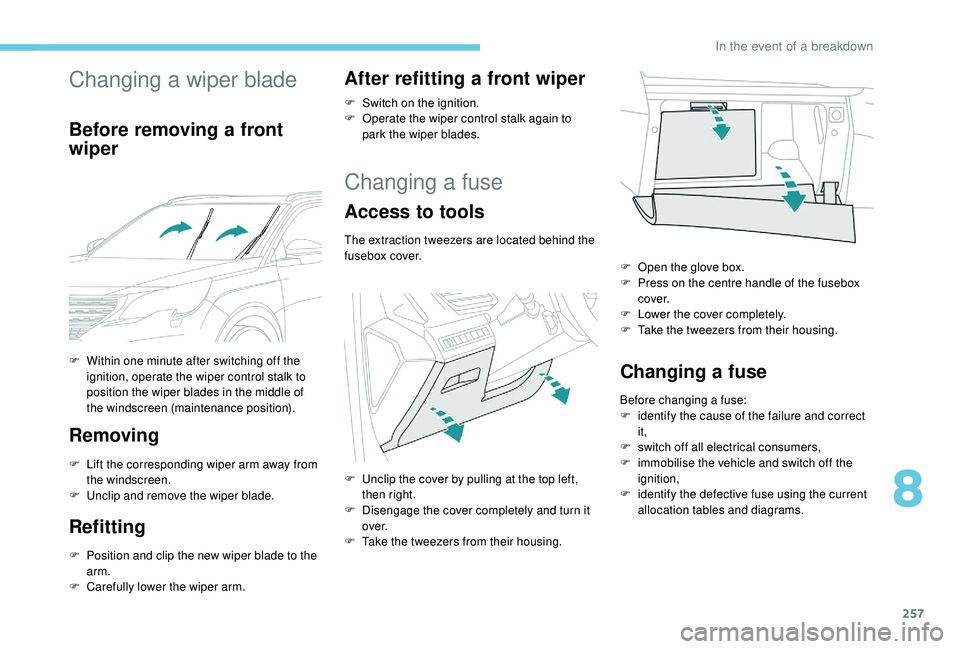
257
Changing a wiper blade
Before removing a front
w iper
Removing
F Lift the corresponding wiper arm away from the windscreen.
F
U
nclip and remove the wiper blade.
Refitting
F Position and clip the new wiper blade to the arm.
F
C
arefully lower the wiper arm.
After refitting a front wiper
F Switch on the ignition.
F O perate the wiper control stalk again to
park the wiper blades.
Changing a fuse
Access to tools
The extraction tweezers are located behind the
fusebox cover.
Changing a fuse
Before changing a fuse:
F i dentify the cause of the failure and correct
it,
F
s
witch off all electrical consumers,
F
i
mmobilise the vehicle and switch off the
ignition,
F
i
dentify the defective fuse using the current
allocation tables and diagrams.
F
W
ithin one minute after switching off the
ignition, operate the wiper control stalk to
position the wiper blades in the middle of
the windscreen (maintenance position).
F
U
nclip the cover by pulling at the top left,
then right.
F
D
isengage the cover completely and turn it
ove r.
F
T
ake the tweezers from their housing. F
O
pen the glove box.
F
P
ress on the centre handle of the fusebox
c ove r.
F
L
ower the cover completely.
F
T
ake the tweezers from their housing.
8
In the event of a breakdown
Page 357 of 364
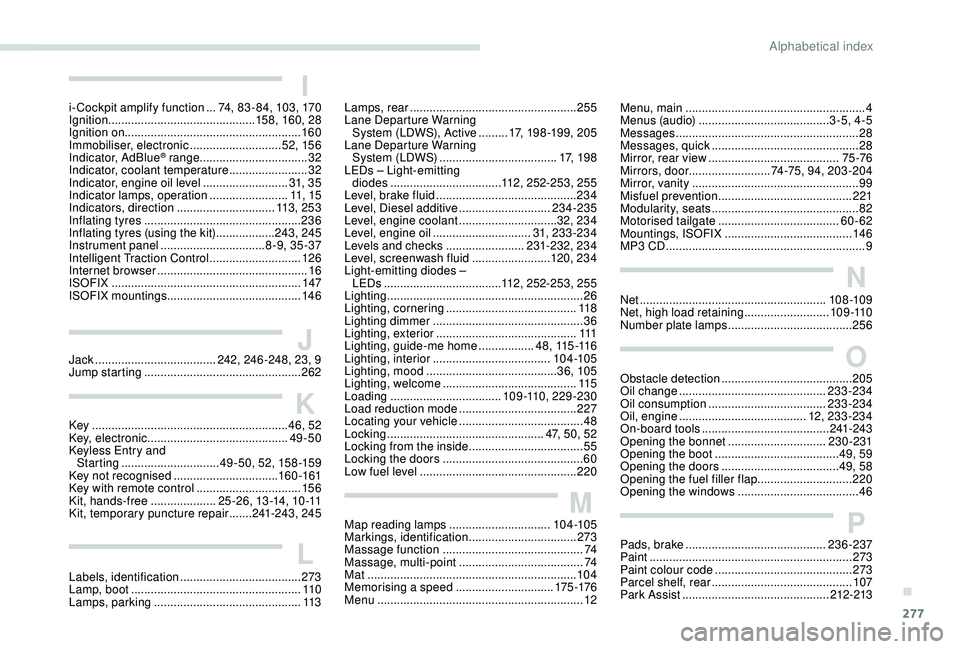
277
Key ............................................................ 46, 52
Key, electronic ........................................... 49-50
Keyless Entry and Starting
.............................. 49 - 5 0, 52, 15 8 -159
Key not recognised
................................ 16
0 -161
Key with remote control
................................15
6
Kit, hands-free
.................... 2
5 -2 6 , 13 -14, 10 -11
Kit, temporary puncture repair
....... 24
1-243, 245Map reading lamps
............................... 10
4 -105
Markings, identification
.................................273
Massage function
...........................................74
Massage, multi-point
......................................74
Mat
................................................................104
Memorising a
speed
..............................17
5 -176
Menu
...............................................................12K
J
L
M
Labels, identification ..................................... 273
Lamp, boot .................................................... 11 0
Lamps, parking
............................................. 113
Jack
...............................
......
242, 246 -248, 23, 9
Jump starting
................................................
262
Ii-Cockpit amplify function ...7 4, 83 - 84, 103, 170
Ignition ................ ............................. 158, 160, 28
Ignition on ...................................................... 160
Immobiliser, electronic
............................52, 15 6
Indicator, AdBlue
® range ................................. 32
Indicator, coolant temperature ........................ 32
Indicator, engine oil level
.......................... 31, 3 5
Indicator lamps, operation
........................ 11
, 15
Indicators, direction
.............................. 113 , 2 5 3
Inflating tyres
................................................ 236
Inflating tyres (using the kit)
.................. 24
3, 245
Instrument panel
................................ 8 -9, 35 -37
Intelligent Traction Control
............................ 126
Internet browser
.............................................. 16
I
SOFIX
.......................................................... 147
ISOFIX mountings ......................................... 14 6Lamps, rear
...................................................
255
Lane Departure Warning System (LDWS), Active
.........
17, 198 -19 9, 205
Lane Departure Warning System (LDWS) ....................................17, 1 9 8
LEDs – Light-emitting diodes
..................................112, 252-253, 255
Level, brake fluid
...........................................234
Level, Diesel additive
............................234-235
Level, engine coolant
..............................32, 234
Level, engine oil
..............................31, 233-234
Levels and checks
........................23
1-232, 234
Level, screenwash fluid
........................1
20, 234
Light-emitting diodes – LEDs
...............................
.....112, 252-253, 255
Lighting
............................................................26
Lighting, cornering
........................................11 8
Lighting dimmer
..............................................36
Lighting, exterior
...........................................111
Lighting, guide-me home
.................4 8 , 115 -11 6
Lighting, interior
...............................
.....104 -105
Lighting, mood
........................................36, 105
Lighting, welcome
.........................................115
Loading
..................................109 -110, 229 -230
Load reduction mode
....................................227
Locating your vehicle
......................................48
Locking
...............................
.................47, 50, 52
Locking from the inside
...................................55
Locking the doors
........................................... 60
L
ow fuel level
................................................2
20Menu, main
.......................................................
4
M
enus (audio)
........................................
3-5, 4-5
Messages
........................................................
28
Messages, quick ............................................. 28
M irror, rear view ........................................75 -76
Mirrors, door ......................... 74-75, 94, 203 -204
Mirror, vanity
...................................................99
Misfuel prevention
.........................................221
Modularity, seats
.............................................82
Motorised tailgate
..................................... 6
0-62
Mountings, ISOFIX
.......................................14 6
MP3
CD .............................................................9
N
Net ......................................................... 108 -109
Net, high load retaining ..........................109 -110
Number plate lamps
...................................... 256
O
Obstacle detection ........................................ 205
Oil change ............................................. 23
3-234
Oil consumption
.................................... 233-234
Oil, engine
....................................... 12, 233-234
On-board tools
....................................... 241-243
Opening the bonnet
..............................230-231
Opening the boot
...................................... 49, 59
Opening the doors
.................................... 49, 58
Opening the fuel filler flap
.............................220
Opening the windows
..................................... 46
P
ads, brake
........................................... 236-237
Paint
.............................................................. 273
Paint colour code
.......................................... 273
Parcel shelf, rear
........................................... 107
Park Assist
...............................
..............212-213
P
.
Alphabetical index